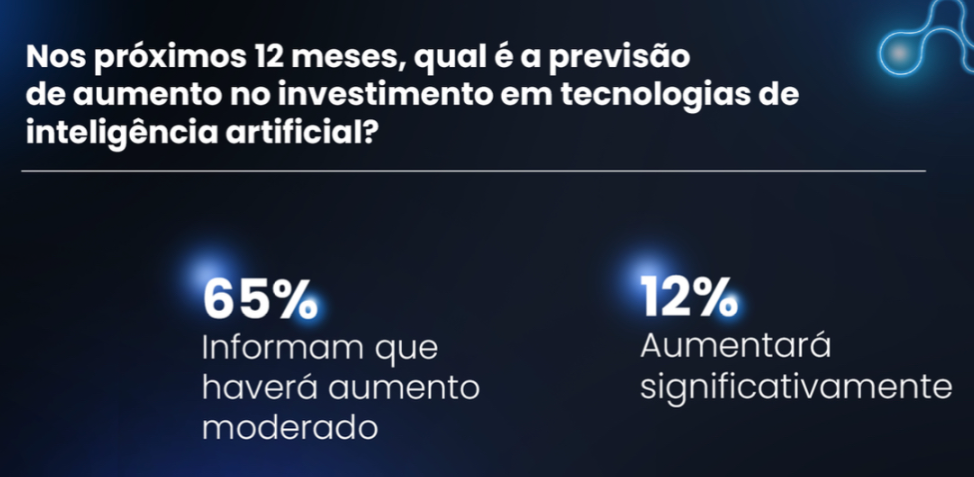 A AI in healthcare It becomes increasingly present in everyday life, playing important roles in various areas. In the healthcare area in particular, this resource has become crucial and several companies in this segment are seeking to increase their level of maturity in order to implement AI in their solutions.
A AI in healthcare It becomes increasingly present in everyday life, playing important roles in various areas. In the healthcare area in particular, this resource has become crucial and several companies in this segment are seeking to increase their level of maturity in order to implement AI in their solutions.
Artificial intelligence has become increasingly useful in the healthcare sector, bringing significant advances, but also important challenges to be faced. Advances in artificial intelligence in healthcare offer promising opportunities to improve the diagnosis, treatment and prevention of diseases, as well as providing more personalized care for patients.
Artificial intelligence can be used to process large volumes of medical data such as electronic health records, medical images and genetic data, identifying patterns and providing valuable insights to healthcare professionals. Machine learning algorithms and neural networks can help in early detection of diseases, analysis of symptoms and vital signs, prediction of treatment results and identification of risk factors.
Furthermore, artificial intelligence has also been applied in the area of medical robotics, enabling more precise and minimally invasive surgical procedures. Surgical robots controlled by artificial intelligence systems can assist surgeons in complex interventions, reducing risks and improving results.

See how Artificial Intelligence has been working in healthcare:
Diagnosis and screening: AI can help analyze medical exams, such as X-ray images, MRIs, and CT scans, to accurately identify diseases and conditions.
Personalization of treatment: AI can help doctors create personalized treatment plans based on patients' individual characteristics, such as medical history, genetics and lifestyle.
Data analysis: AI can process large volumes of medical data, identifying trends and patterns that doctors can use to make informed decisions.
Precision medicine: AI can help identify specific therapeutic targets and develop personalized medicines for patients based on their genetics.
Virtual healthcare: Chatbots and virtual assistants can provide health information, schedule appointments and track treatment progress, improving access to healthcare.
Remote Monitoring: AI-connected devices and sensors can monitor patients in real time, alerting them to any health issues and reducing the need for hospitalization.
Prevention of diseases: AI can predict disease outbreaks, identify risk factors, and help design more effective prevention strategies.
Reduction of medical errors: AI can help reduce medical errors by improving accuracy in diagnosis and treatment.
Anahp Mapping 2023
Mapping was carried out during the months of July, August and September 2023, by the National Association of Private Hospitals (Anahp) and the Brazilian Association of Health Startups (ABSS), with the aim of understanding, in detail, the degree of maturity of hospitals for the use of artificial intelligence, as well as guiding the creation and improvement of AI solutions for the hospital segment.
According to the data collected in the mapping, 62.5% of institutions stated that they use AI in some way and 4.16% classify the progress of their institutions with a grade between 4 and 5, on a scale of 1 to 5, where 5 is the grade taller. Still among those surveyed, 51% said that the investments made brought practical results and in the next 12 months 65% reported that they intend to increase their investment in AI technologies.
Challenges of AI in healthcare
However, there are challenges to be faced in the development and adoption of artificial intelligence in healthcare.
The privacy and security of health data are important concerns, requiring the implementation of robust protective measures. Furthermore, the correct interpretation of the results generated by artificial intelligence algorithms is essential, as medical decisions based on incorrect analyzes can have serious consequences. It is also necessary to ensure that artificial intelligence is ethical and impartial.
Algorithms must be developed taking into account the diversity of the population served, avoiding discrimination and prejudice. The transparency and explainability of artificial intelligence models are also challenges in promoting trust among healthcare professionals and patients. In summary, advances in artificial intelligence in healthcare offer great prospects for improvements in medical care, diagnosis and treatment of diseases. However, it is essential to address challenges related to privacy, security, correct interpretation of results, ethics and impartiality to ensure the effectiveness and security of these solutions.
Within the mapping carried out, some important challenges were also highlighted to be overcome so that some institutions can increase their investments in this technology, including:
How to communicate with doctors who are also clients?
Adherence to new technologies and spending time on administrative activities;
Maintain attention and care for patients outside the hospital (before, during and after);
Integration with laboratories is also a concern, as there is no investment on their part, according to those surveyed;
I am concerned about the security of patient data and data sharing, especially regarding the cultural habit of using WhatsApp.
 What's next?
What's next?
New models are beginning to be designed, encompassing hospitals, the pharmaceutical industry, and healthcare operators with the aim of accelerating the adoption of new technologies and sustainable strategies in the medium and long term.
Hospitals begin the B2B strategy with greater force, offering new care models, independently: Primary Health Care (PHC) for companies, teleconsultation, tele-specialist, telemonitoring, tele-propedeutics and consultancy for other hospitals.
Take the first step towards AI with SAUDI
O SAUDI is a data-centric platform for managing healthcare costs, population health and patients 100% integrable. We are an experienced partner who will help your company navigate the journey of the digital revolution in healthcare. Our team of experts is able to help optimize processes, BI and AI according to your business growth strategy. Speak right now with one of our experts!











